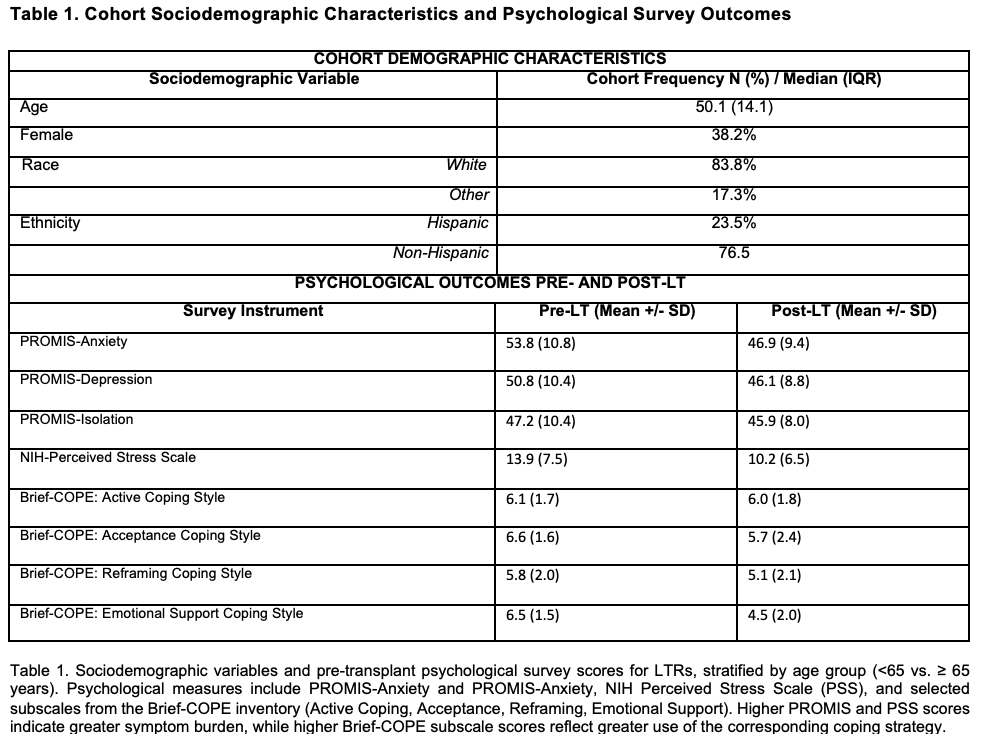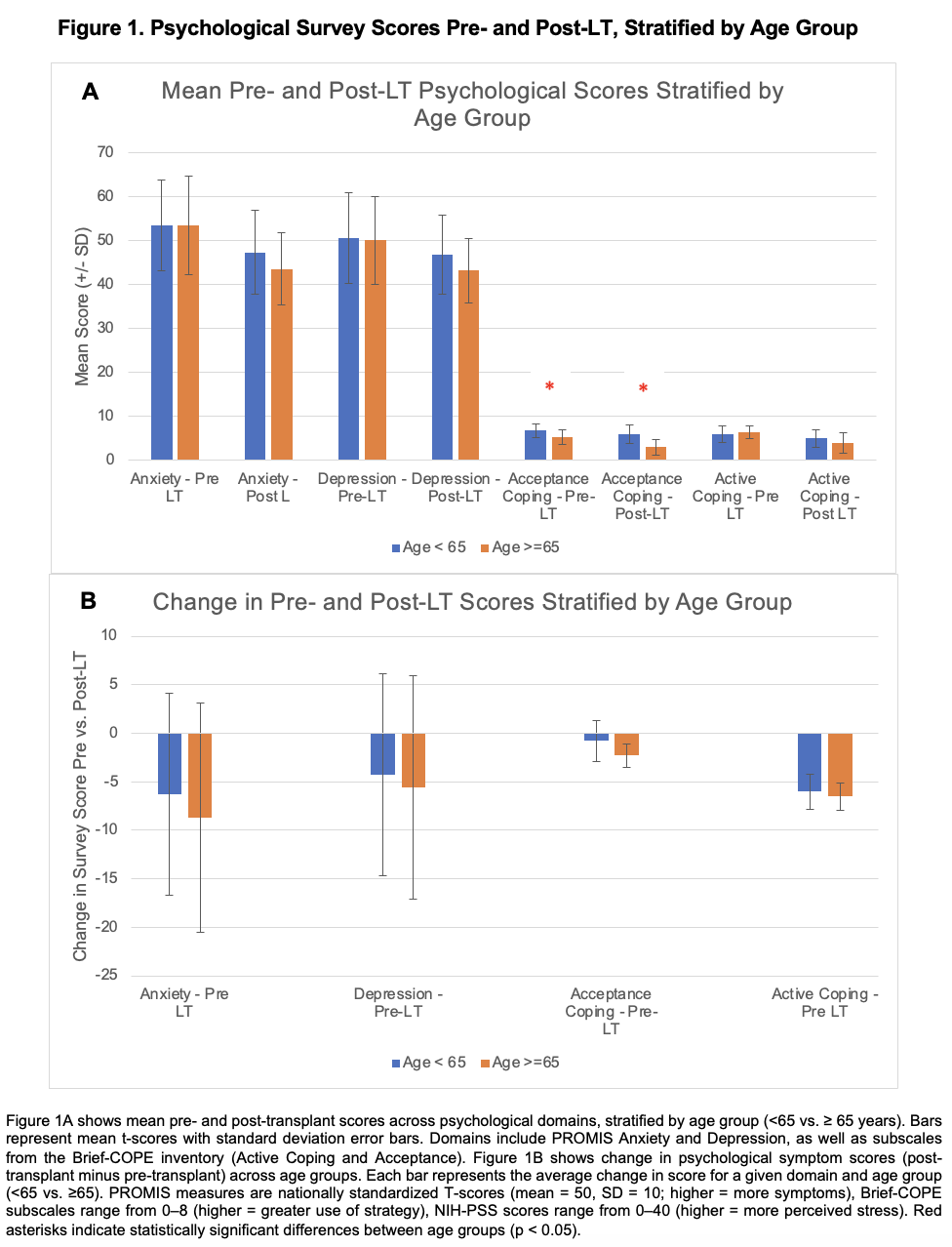Tuesday Poster Session
Category: Liver
P5900 - The Impact of Aging on Coping Strategies and Psychological Health Metrics After Liver Transplantation
Tuesday, October 28, 2025
10:30 AM - 4:00 PM PDT
Location: Exhibit Hall

Kishore Botla, BS
University of Texas Southwestern Medical Center
Dallas, TX
Presenting Author(s)
Kishore Botla, BS1, Hannah R. Klatzkow, MD1, Alvaro Noriega Ramirez, 1, Dyanna Gregory, MS1, Arjmand Mufti, MD1, Thomas A.. Kerr, MD, PhD1, Lisa VanWagner, MD, MSc1, Amit G. Singal, MD, MS2, Sarah R.. Lieber, MD, MSCR1
1University of Texas Southwestern Medical Center, Dallas, TX; 2Department of Internal Medicine, UT Southwestern Medical Center, Dallas, Texas, Dallas, TX
Introduction: As the population of liver transplant (LT) recipients continues to age, a growing proportion of transplants are being performed in adults over 65. While survival outcomes for older recipients have improved, less is known about their psychological wellbeing following transplantation. We aimed to characterize changes in psychological symptoms pre- vs. post-LT and examine how aging affects psychological symptom burden and coping patterns during recovery.
Methods: Adult LT recipients (LTRs) were prospectively enrolled at an academic transplant center and completed validated psychological surveys at baseline (waitlist) and at 6- or 12-months post-LT. Surveys included: 1) PROMIS (Patient-Reported Outcomes Measurement Information System) Anxiety, Depression, and Social Isolation scales; 2) NIH Perceived Stress Scale (PSS); and 3) Brief-COPE, which assesses reliance on specific coping strategies. Scores were analyzed using paired t-tests or ANOVA to evaluate pre- vs. post-LT differences. Change scores were computed for each participant. Multivariable linear regression was used to identify factors associated with greater psychological symptom burden post-LT, with a focus on recipient age (< 65 vs. ≥ 65 years).
Results: 68 LTRs completed pre- and post-LT assessments (mean age 50.1 ± 14.1 years; 38.2% female; 83.8% white; 23.5% Hispanic). Compared to recipients aged < 65, those ≥ 65 demonstrated significantly lower reliance on acceptance coping strategies both pre-LT (5.3 ± 1.6 vs. 6.8 ± 1.5, p=0.03) and post-LT (3.0 ± 1.7 vs. 6.0 ± 2.2, p=0.003). Older adults also exhibited greater declines in acceptance coping over time (–2.3 ± 1.2 vs. –0.8 ± 2.1, p=0.02). No statistically significant differences were observed between age groups in changes to PROMIS anxiety, depression, or isolation scores, nor in the use of active coping strategies.
Discussion: LTRs aged ≥ 65 experienced changes in psychological symptoms post-transplant, showing decreased reliance on adaptive coping strategies such as acceptance and active coping, both before and after LT. This finding may reflect greater vulnerability or differing recovery trajectories in older LTRs. Limited coping flexibility has been associated with worse emotional and functional outcomes in geriatric populations. Thus, integrating age-sensitive behavioral coping interventions that integrate acceptance and active coping styles into longitudinal post-LT care could promote psychological recovery and improve quality of life across the transplant continuum.

Figure: Table 1. Cohort Sociodemographic Characteristics and Psychological Survey Outcomes

Figure: Figure 1. Psychological Survey Scores Pre- and Post-LT, Stratified by Age Group
Disclosures:
Kishore Botla indicated no relevant financial relationships.
Hannah Klatzkow indicated no relevant financial relationships.
Alvaro Noriega Ramirez indicated no relevant financial relationships.
Dyanna Gregory indicated no relevant financial relationships.
Arjmand Mufti indicated no relevant financial relationships.
Thomas Kerr indicated no relevant financial relationships.
Lisa VanWagner: Alpha Insights – Consultant. Gerson Lehrman Group – Consultant. Madrigal Pharmaceutical – Advisory Committee/Board Member, Grant/Research Support. Slingshot Insights – Consultant. W.L. Gore & Associates – Grant/Research Support.
Amit Singal: AstraZeneca – Consultant. Bayer – Consultant. Boston Scientific – Consultant. Eisai – Consultant. Elevar – Consultant. Exact Sciences – Consultant. Exelixis – Consultant. FujiFilm Medical Sciences – Consultant. Genentech – Consultant. Glycotest – Consultant. HistoSonics – Consultant. Merck – Consultant. Sirtex – Consultant.
Sarah Lieber indicated no relevant financial relationships.
Kishore Botla, BS1, Hannah R. Klatzkow, MD1, Alvaro Noriega Ramirez, 1, Dyanna Gregory, MS1, Arjmand Mufti, MD1, Thomas A.. Kerr, MD, PhD1, Lisa VanWagner, MD, MSc1, Amit G. Singal, MD, MS2, Sarah R.. Lieber, MD, MSCR1. P5900 - The Impact of Aging on Coping Strategies and Psychological Health Metrics After Liver Transplantation, ACG 2025 Annual Scientific Meeting Abstracts. Phoenix, AZ: American College of Gastroenterology.
1University of Texas Southwestern Medical Center, Dallas, TX; 2Department of Internal Medicine, UT Southwestern Medical Center, Dallas, Texas, Dallas, TX
Introduction: As the population of liver transplant (LT) recipients continues to age, a growing proportion of transplants are being performed in adults over 65. While survival outcomes for older recipients have improved, less is known about their psychological wellbeing following transplantation. We aimed to characterize changes in psychological symptoms pre- vs. post-LT and examine how aging affects psychological symptom burden and coping patterns during recovery.
Methods: Adult LT recipients (LTRs) were prospectively enrolled at an academic transplant center and completed validated psychological surveys at baseline (waitlist) and at 6- or 12-months post-LT. Surveys included: 1) PROMIS (Patient-Reported Outcomes Measurement Information System) Anxiety, Depression, and Social Isolation scales; 2) NIH Perceived Stress Scale (PSS); and 3) Brief-COPE, which assesses reliance on specific coping strategies. Scores were analyzed using paired t-tests or ANOVA to evaluate pre- vs. post-LT differences. Change scores were computed for each participant. Multivariable linear regression was used to identify factors associated with greater psychological symptom burden post-LT, with a focus on recipient age (< 65 vs. ≥ 65 years).
Results: 68 LTRs completed pre- and post-LT assessments (mean age 50.1 ± 14.1 years; 38.2% female; 83.8% white; 23.5% Hispanic). Compared to recipients aged < 65, those ≥ 65 demonstrated significantly lower reliance on acceptance coping strategies both pre-LT (5.3 ± 1.6 vs. 6.8 ± 1.5, p=0.03) and post-LT (3.0 ± 1.7 vs. 6.0 ± 2.2, p=0.003). Older adults also exhibited greater declines in acceptance coping over time (–2.3 ± 1.2 vs. –0.8 ± 2.1, p=0.02). No statistically significant differences were observed between age groups in changes to PROMIS anxiety, depression, or isolation scores, nor in the use of active coping strategies.
Discussion: LTRs aged ≥ 65 experienced changes in psychological symptoms post-transplant, showing decreased reliance on adaptive coping strategies such as acceptance and active coping, both before and after LT. This finding may reflect greater vulnerability or differing recovery trajectories in older LTRs. Limited coping flexibility has been associated with worse emotional and functional outcomes in geriatric populations. Thus, integrating age-sensitive behavioral coping interventions that integrate acceptance and active coping styles into longitudinal post-LT care could promote psychological recovery and improve quality of life across the transplant continuum.

Figure: Table 1. Cohort Sociodemographic Characteristics and Psychological Survey Outcomes

Figure: Figure 1. Psychological Survey Scores Pre- and Post-LT, Stratified by Age Group
Disclosures:
Kishore Botla indicated no relevant financial relationships.
Hannah Klatzkow indicated no relevant financial relationships.
Alvaro Noriega Ramirez indicated no relevant financial relationships.
Dyanna Gregory indicated no relevant financial relationships.
Arjmand Mufti indicated no relevant financial relationships.
Thomas Kerr indicated no relevant financial relationships.
Lisa VanWagner: Alpha Insights – Consultant. Gerson Lehrman Group – Consultant. Madrigal Pharmaceutical – Advisory Committee/Board Member, Grant/Research Support. Slingshot Insights – Consultant. W.L. Gore & Associates – Grant/Research Support.
Amit Singal: AstraZeneca – Consultant. Bayer – Consultant. Boston Scientific – Consultant. Eisai – Consultant. Elevar – Consultant. Exact Sciences – Consultant. Exelixis – Consultant. FujiFilm Medical Sciences – Consultant. Genentech – Consultant. Glycotest – Consultant. HistoSonics – Consultant. Merck – Consultant. Sirtex – Consultant.
Sarah Lieber indicated no relevant financial relationships.
Kishore Botla, BS1, Hannah R. Klatzkow, MD1, Alvaro Noriega Ramirez, 1, Dyanna Gregory, MS1, Arjmand Mufti, MD1, Thomas A.. Kerr, MD, PhD1, Lisa VanWagner, MD, MSc1, Amit G. Singal, MD, MS2, Sarah R.. Lieber, MD, MSCR1. P5900 - The Impact of Aging on Coping Strategies and Psychological Health Metrics After Liver Transplantation, ACG 2025 Annual Scientific Meeting Abstracts. Phoenix, AZ: American College of Gastroenterology.

